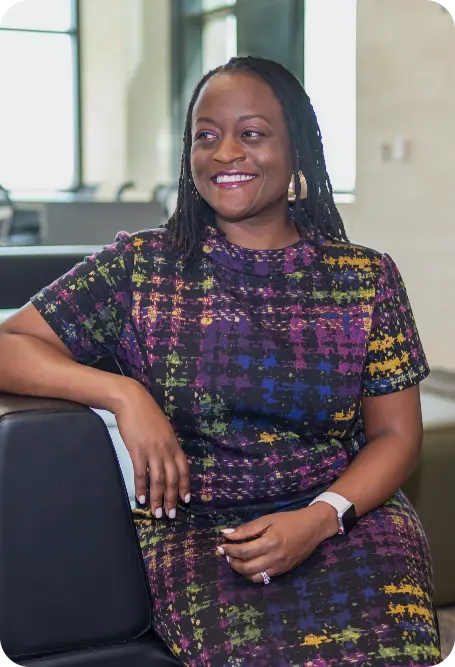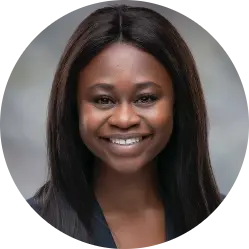CEO Message

Tera Frederick Howard,
MD MPH, Founder MentorMeMed
I distinctly remember the first time I decided to be a doctor. I was at Millwood Elementary School during library time, and I came across a book about the human brain. I read about the “medulla oblongata” and more than exposing me to a very intriguing word, the book sparked in me a passion to learn more about the human body.
For me, that passion evolved into a relentless pursuit of a career in medicine. But back then, I didn’t know what a path in medicine would look like, be like or feel like. I didn’t know because there was no one in my immediate sphere who had gone down it before. There were no family members or family friends or friends of friends or church members who could pass on to me the blueprint for success in my chosen field. So, I packed my knapsack with determination and faith, and embarked upon the journey anyway.
Unfortunately, my experience is not uncommon among people who look like me and those from other racially and ethnically minoritized groups.Although the US population is 36% Black, Hispanic and American Indian, these groups comprise only 11% of the active physician workforce and 9% of full-time academic faculty. To be underrepresented in medicine (URiM) is, by definition, to walk down a path less traveled and in many cases, to do so without a GPS.
Mentorship in academic medicine has been associated with personal development, career choice, productivity, grant success and publication success. Over the longterm, it is associated with academic promotion, faculty retention and career satisfaction. Unfortunately, despite the benefits of mentorship, not every group has equitable access to it.
If you are interested in becoming an active part of the solution to diversify medicine, we invite you to partner with us and become a subscribing institution, a corporate sponsor or individual donor. Join us!
For me, that passion evolved into a relentless pursuit of a career in medicine. But back then, I didn’t know what a path in medicine would look like, be like or feel like. I didn’t know because there was no one in my immediate sphere who had gone down it before. There were no family members or family friends or friends of friends or church members who could pass on to me the blueprint for success in my chosen field. So, I packed my knapsack with determination and faith, and embarked upon the journey anyway.
Unfortunately, my experience is not uncommon among people who look like me and those from other racially and ethnically minoritized groups.Although the US population is 36% Black, Hispanic and American Indian, these groups comprise only 11% of the active physician workforce and 9% of full-time academic faculty. To be underrepresented in medicine (URiM) is, by definition, to walk down a path less traveled and in many cases, to do so without a GPS.
to be URiM is, by definition, to walk down a path less traveled, and in many cases, to do so without a GPS
URiM’s and those from other disadvantaged groups (such as first-generation college graduates and those from financially disadvantaged backgrounds) face a unique set of barriers when pursuing a successful career in medicine. Some are external (such as blatant disparities in K-12 education, discriminatory admission processes in higher education or biased performance evaluations) and others are internal (such as with imposter syndrome or stereotype threat). And yet, we know that overcoming these barriers to diversify medicine is of paramount importance as we seek to deliver equitable care to an ever-changing, increasingly diverse patient population.Mentorship in academic medicine has been associated with personal development, career choice, productivity, grant success and publication success. Over the longterm, it is associated with academic promotion, faculty retention and career satisfaction. Unfortunately, despite the benefits of mentorship, not every group has equitable access to it.
Thus, the mission of MentorMeMed is to bridge the gap between the known benefits of mentorship and the difficulty URiM’s (and other disadvantaged groups), have finding it.
It is an online platiorm designed to help URiM medical students and trainees find affinity-based mentorship from qualified faculty in self-identified areas of need. In addition to providing mentorship for URiM learners, MentorMeMed reduces the “minority tax” that URiM faculty face by spreading the responsibility of mentorship across all qualified, trained and willing faculty. In sum, MentorMeMed seeks to level the playing field for URiM’s in pursuit of medical careers, by erasing boundaries of access to career and life advice, shadowing and research opportunities, professional networking and writing help.If you are interested in becoming an active part of the solution to diversify medicine, we invite you to partner with us and become a subscribing institution, a corporate sponsor or individual donor. Join us!
Tera Frederick Howard,
MD MPH, Founder MentorMeMed








